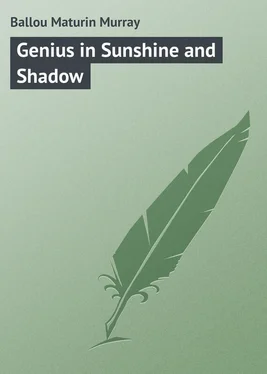Maturin Ballou - Genius in Sunshine and Shadow
Здесь есть возможность читать онлайн «Maturin Ballou - Genius in Sunshine and Shadow» — ознакомительный отрывок электронной книги совершенно бесплатно, а после прочтения отрывка купить полную версию. В некоторых случаях можно слушать аудио, скачать через торрент в формате fb2 и присутствует краткое содержание. Жанр: foreign_prose, foreign_humor, Анекдоты, на английском языке. Описание произведения, (предисловие) а так же отзывы посетителей доступны на портале библиотеки ЛибКат.
- Название:Genius in Sunshine and Shadow
- Автор:
- Жанр:
- Год:неизвестен
- ISBN:нет данных
- Рейтинг книги:4 / 5. Голосов: 1
-
Избранное:Добавить в избранное
- Отзывы:
-
Ваша оценка:
- 80
- 1
- 2
- 3
- 4
- 5
Genius in Sunshine and Shadow: краткое содержание, описание и аннотация
Предлагаем к чтению аннотацию, описание, краткое содержание или предисловие (зависит от того, что написал сам автор книги «Genius in Sunshine and Shadow»). Если вы не нашли необходимую информацию о книге — напишите в комментариях, мы постараемся отыскать её.
Genius in Sunshine and Shadow — читать онлайн ознакомительный отрывок
Ниже представлен текст книги, разбитый по страницам. Система сохранения места последней прочитанной страницы, позволяет с удобством читать онлайн бесплатно книгу «Genius in Sunshine and Shadow», без необходимости каждый раз заново искать на чём Вы остановились. Поставьте закладку, и сможете в любой момент перейти на страницу, на которой закончили чтение.
Интервал:
Закладка:
Speaking of authors writing from their own personal experience recalls a name which we must not neglect to mention. Laurence Sterne, author of "Tristram Shandy," various volumes of sermons, the "Sentimental Journey," etc., was a curious compound in character, but possessed of real genius. He was quite a sentimentalist in his writings, and those who did not know him personally would accredit him with possessing a tender heart. The fact was, however, as Horace Walpole said of him, "He had too much sentiment to have any feeling." His mother, who had run in debt on account of an extravagant daughter, would have been permitted to remain indefinitely in jail, but for the kindness of the parents of her pupils. Her son Laurence heeded her not. "A dead ass was more important to him than a living mother," says Walpole. Sterne also used his wife very ill. One day he was talking to Garrick in a fine sentimental manner in praise of conjugal love and fidelity. "The husband," said Sterne, "who behaves unkindly to his wife, deserves to have his house burned over his head." Garrick's reply was only just: "If you think so, I hope your house is insured." He is known to have been engaged to a Miss Fourmantel for five years, and then to have jilted her so cruelly that she ended her days in a mad-house. Such was the great Laurence Sterne. It was poetical justice that he should repent at leisure of his subsequent hasty marriage to one whom he had known only four weeks. He twice visited the lady whom he had deceived, in the establishment where she was confined; and the character of Maria, whom he so pathetically describes, is drawn from her, showing how cheaply he could coin his pretended feelings. Contradictions in character are often ludicrous, and go to show that the author and the man are seldom one. What can be more contradictory in the nature of the same individual than Sterne whining over a dead ass and neglecting to relieve a living mother; or Prior addressing the most romantic sonnets to his Chloe, and at the same time indulging a sentimental passion for a barmaid?
Goldsmith's "Deserted Village," according to Mr. Best, an Irish clergyman, relates to the scenes in which Goldsmith was himself an actor. Auburn is a poetical name for the village of Lissoy, county of Westneath. The name of the schoolmaster was Paddy Burns. "I remember him well," says Mr. Best; "he was indeed a man severe to view. A woman called Walsey Cruse kept the ale-house. I have often been within it. The hawthorn bush was remarkably large, and stood in front of the ale-house." The author of the "Deserted Village," however, made his best contemporary "hit" with his poem of the "Traveller." He always distrusted his poetic ability, and this poem was kept on hand some years after it was completed, before he published it in 1764. It passed through several editions in the first year, and proved a golden harvest to Newbury the publisher; but Goldsmith received only twenty guineas for the manuscript.
The character of Sober, in Johnson's "Idler," is a portrait of himself; and he admitted more than once that he had his own outset in life in his mind when he wrote the Eastern story of "Gelaleddin." Is not "Tristram Shandy" a synonym for its author, Sterne? Hazlitt and many others fuse the personality of the author of the "Imaginary Conversations" with this admirable work from his pen: certainly a high compliment to Landor, if the portraiture is a likeness. Walter Savage Landor 62 62 "I had learned from his works," remarks Lady Blessington, after meeting Landor at Florence, in May, 1825, "to form a high opinion of the man as well as the author. But I was not prepared to find in him the courtly, polished gentleman of high breeding, of manners, deportment, and demeanor, that one might expect to meet with in one who had passed the greater part of his life in courts."
was a most erratic genius, a man of uncontrollable passions which led him into constant difficulties; at times he must have been partially deranged. In all his productions he exhibits high literary culture; and being born to a fortune, he was enabled to adapt himself to his most fastidious tastes, though in the closing years of his life, having lost his money, he learned the meaning of that bitter word dependence. The severest critic must accord him the genius of a poet; but his literar reputation will rest upon his elaborate prose work, "Imaginary Conversations" of literary men and statesmen, upon which he was engaged for more than ten years. He lived to the age of ninety, and found solace in his pen to the last.
CHAPTER III
As we have already remarked, authors are very much like other people, rarely coming up to the idea formed of them by enthusiastic readers. They are pretty sure to have some idiosyncrasies more or less peculiar; and who, indeed, has not? To know the true character of these individuals, we should see them in their homes rather than in their books.
Having so lately spoken of Landor, we are reminded of another literary character who in many respects resembled him. William Beckford, the English author, utterly despised literary fame, and when he wrote he could afford to do so, for he was a millionnaire. His romance of "Vathek," as an Eastern tale, was pronounced by the critics superior to "Rasselas;" and indeed "Rasselas, Prince of Abyssinia," is hardly in any sense an Eastern tale. "Johnson," says Macaulay, "not content with turning filthy savages, ignorant of their letters and gorged with raw steaks cut from living cows, into philosophers as eloquent and enlightened as himself or his friend Burke, and into ladies as accomplished as Mrs. Lennox or Mrs. Sheridan, transferred the whole domestic system of England to Egypt." Beckford read to Rogers one of his novels in which the hero was a Frenchman who was ridiculously fond of dogs, and in which his own life was clearly depicted. Even this millionnaire author was finally reduced to such necessity as obliged him to sell his private pictures for subsistence. The last which he disposed of was Bellini's portrait of the "Doge of Venice," which was bought for and hung in the National Gallery on the very day that Beckford died, in 1844.
Certainly those authors who give us their own personal experience as a basis for their sketches are no plagiarists. The late Wendell Phillips 63 63 This man scornfully renounces your civil organizations, – county and city, or governor or army; is his own navy and artillery, judge and jury, legislature and executive. He has learned his lessons in a bitter school. — Emerson.
delighted, in his lecture on the "Lost Arts," to prove that there was nothing new under the sun; a not uncongenial task for this "silver-tongued orator," who was an iconoclast by nature. So early as the age of twenty-five he relinquished the practice of the law because he was unwilling to act under an oath to the Constitution of the United States. In one sense there is nothing new under the sun. Genius has not hesitated to borrow bravely from history and legend. The "Amphitrion" of Molière was adopted from Plautus, who had borrowed it from the Greeks, and they from the Indians. Any one reading a collection of the Arabian stories for the first time will be surprised at meeting so many which are familiar, and which he had thought to be of modern birth. La Fontaine borrowed from Petronius the "Ephesian Matron," which had been taken from Greek annals, having been previously transferred from the Arabic, where it appeared taken from the Chinese. There is no ignoring the fact that a large portion of our plots belonged originally to Eastern nations. The graceful, attractive, and patriotic story of William Tell was proven by the elder son of Haller, a century ago, to have been, in the main features, but the revival of a Danish story to be found in Saxo Grammaticus. The interesting legend of the apple was but a fable revived. The English story of Whittington and his Cat was common two thousand years ago in Persia.
Интервал:
Закладка:
Похожие книги на «Genius in Sunshine and Shadow»
Представляем Вашему вниманию похожие книги на «Genius in Sunshine and Shadow» списком для выбора. Мы отобрали схожую по названию и смыслу литературу в надежде предоставить читателям больше вариантов отыскать новые, интересные, ещё непрочитанные произведения.
Обсуждение, отзывы о книге «Genius in Sunshine and Shadow» и просто собственные мнения читателей. Оставьте ваши комментарии, напишите, что Вы думаете о произведении, его смысле или главных героях. Укажите что конкретно понравилось, а что нет, и почему Вы так считаете.












